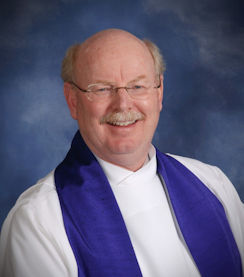The Rev. John Boley reflects on two recent experiences: the confirmation hearings for Judge Brett Kavanaugh and a Sexual Ethics Conference hosted by COSROW.
REV. JOHN BOLEY
Clergy Assistant to the Bishop
 The Senate Judiciary Committee hearings on the confirmation of Judge Brett Kavanaugh had the country riveted. The layers of political and cultural dynamics were as plentiful and thick as we have seen in many years. It was truly stunning to see how human beings can perceive things so differently. Regardless of political persuasions, it is hoped that the entire country became more aware and attuned to the huge prevalence of sexual harassment and misconduct in our midst.
The Senate Judiciary Committee hearings on the confirmation of Judge Brett Kavanaugh had the country riveted. The layers of political and cultural dynamics were as plentiful and thick as we have seen in many years. It was truly stunning to see how human beings can perceive things so differently. Regardless of political persuasions, it is hoped that the entire country became more aware and attuned to the huge prevalence of sexual harassment and misconduct in our midst.
Thanks be to God that The Me Too Movement finally arrived. The dam of abuse, denial and silence has been building for decades, and indeed centuries. Thanks to the Weinstein disclosures as a catalyst, the dam has now broken and I pray that our society never returns to where it has been. Instead, like many of us, I will pray for a future of honesty, integrity and equality between genders.
This past week, Bishop David and I, along with David Hills and Sondra Willoughby, two members of our Healthy Boundaries Task Force, attended the, “Do No Harm,” Sexual Ethics Conference offered by the United Methodist Church’s Committee on the Status and Role of Women. We heard powerful presentations on the continued existence of sexual misconduct in the United Methodist Church. This long planned-for conference was as timely as could be after the Kavanaugh hearings.
From the # Me Too Tool Kit of resources produced by COSROW, here are a few things that all of us can do:
- Refuse to be a silent bystander when we hear or see someone say or do something that could be harassment. Intervene. How are we holding one another accountable for behavior?
- Respect and affirm women and men in such a way that they know they will be believed if they choose to confide their experiences. One way to practice and cultivate a culture of respect and affirmation is by supporting women called to ministry.
- Encourage our local churches to utilize available resources and take action to continue to protect the vulnerable, care for the broken-hearted and seek justice. Resources available from COSROW include the #Me Too Tool Kit and The Way of Integrity: Living in Right Relationship with Self, Others and God.
- The simplest and most profound act of Christian response is this: Listening to those who have suffered. By listening to stories, we can learn. And by learning, perhaps we as local church communities can take proactive steps to prevent more abuse from happening and to help survivors find true healing in Christ. As one victim disclosed, “My church helped me to see how God sees me and who I am, instead of who I am not.”
Oh Gracious God, forgive us for our continual mistreatment of others, and free us for grateful love and respect of others in Jesus Christ.
Last Updated on October 31, 2023

